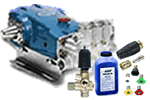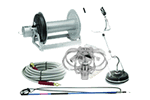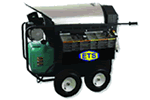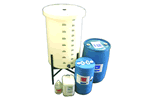ITEM 11559.920X M – GRAFFITI REMOVAL FROM UNTREATED SURFACES
Pag e 1 of 6 6/9/04
DESCRIPTION This work shall consist of removing graffiti by the methods described in this
specification.
MATERIALS All materials and equipment shall be subject to the Engineer=s approval before
any work can begin.
Abrasive material for blast cleaning shall meet the requirements of §572-2.01, Abrasive for
Blast Cleaning.
POWER WASH Soluble, abrasive blast media shall be a large crystal sodium bicarbonate or a
magnesium sulfate based media. Solubility of the media in water shall be 8.6 g/100 ml.
The equipment with the media shall be a soluble media injector type power washer. The
Contractor shall submit catalog cuts or other documentation for all equipment proposed for use
in this work.
SOLVENT WASH The cleaning compound shall be a blend of an organic solvent of emulsifiers
and surfactants. It shall be a bio-degradable water based mixture developed from non-toxic and
non-corrosive substances. This may be a soybean solution or other, satisfactory to the Engineer.
Mineral spirits are also acceptable for this usage.
The cleaner shall lift graffiti from the substrate surface, and emulsify and dissolve the paint
constituents; pigments; oils; binders and fillers. The material(s) used shall not damage, mar or
reduce the reflectivity of the substrate, when used on a sign panel. Acceptance of the cleaning
compound will be based on the manufacturer=s certification that the material conforms to the
requirements of this specification.
ITEM 11559.920X M – GRAFFITI REMOVAL FROM UNTREATED SURFACES
Some acceptable solvents include the following: Orange Magic Cleaner, as manufactured by Orange
Power, 257-02 Craft Ave., Rosedale, NY 11422; 3M Citrus Base Natural Cleaner, manufactured by 3M
Adhesives, Coatings and Sealers Division, St. Paul, Minnesota 55144; Enviro-Solutions Paint Stripper &
Graffiti Remover, by RCI Trading, P.O.Box 1789, Englewood, CO. 80150-1789; SOY solv, 6154 N CR
33, Tiffin, OH 44883; EZ Solv, by Gemtek, 3808 North 28th Street, Phoenix, AZ, 85017, (800) 331 –
7022; Taginator, by Equipment Trade Service, 20 E. Winona Ave, Norwood, PA 19074; Graffiti Free
Cleaner, Enviro-Northeast, PO Box 975 Highland Lakes N.J. 07422; or Mineral Spirits.
CONSTRUCTION DETAILS
All work must conform to the OSHA standards referred to in subsection 107-05 of the Standard
Specifications.
Unless otherwise directed by the Engineer, the following methods shall be used to remove
graffiti from various surfaces. If one of these prescribed methods is used, and the graffiti still
remains visible, the contractor shall use an alternate method approved by the Engineer. Painting
over graffiti is the preferred option on previously painted surfaces, and where solvents were
unsuccessful at removing graffiti.
Unless otherwise noted or directed by the Engineer, graffiti shall be removed within five (5)
working days of written notification. If a lift device will be necessary, the removal date will be
extended to ten (10) working days.
| GRAFFITI SURFACE | SUGGESTED GRAFFITI REMOVAL METHOD |
| Steel (smooth, non-porous)Wood (painted or unpainted) | Solvent Wash with Enviro-Solutions Paint Stripper &Graffiti Remover; SOYsolv; Mineral Spiritsor Painting Over Graffiti or Power Washing |
| Brick, Stone, Concrete, Pavingblocks (porous, unpainted) | Solvent Wash with Taginator, or Power Washing,or Painting Over Graffiti or Abrasive Blasting |
| Painted masonry | Painting Over Graffiti or Power Wash |
| Sign Panel Faces & Aluminum(unpainted mill finish or anodizedfinish) | Solvent Washing with Enviro-Solutions Paint Stripper &Graffiti Remover; SOY solv; EZ Solv or Mineral Spirits. |
PRIORITY GRAFFITI REMOVAL
Graffiti of a particularly offensive nature, in the opinion of the Engineer, shall be removed by the ITEM 11559.920X M – GRAFFITI REMOVAL FROM UNTREATED SURFACES
contractor within one (1) day after written notification of the existence of such graffiti. This
shall be called PRIORITY GRAFFITI REMOVAL, and will be paid at twice the bid price for the
removal method(s) selected.
POWER WASHING GRAFFITI SURFACES
All graffitied surfaces shall be cleaned with a soluble, abrasive blasting media applied with a
soluble media injector at 20,500 kPa, 19 L per minute or a compressed air delivery system at 690
kPa, 140 L/second, whichever is satisfactory to the Engineer. No particulate matter of any nature
shall be permitted to remain on the cleaned surface. After cleaning, the surface shall be rinsed
with tap water applied with a power washer at 6900 kPa. All visible media shall be removed
SOLVENT WASHING GRAFFITI SURFACES
Pre-Cleaning Materials.
A wet, non-abrasive cleanser is recommended. This cleanser shall not contain strong solvents or
alcohols.
Pre-Cleaning Procedure.
Cleanse the surface of loose dirt particles with clean water.
Use a soft sponge or brush to wash the graffitied surface with detergent and water. Avoid
scrubbing the surface unnecessarily. After the cleaner has been utilized, apply a steady stream of
water on the cleaned surface to wash the dirt particles away.
Allow to dry.
Cleaning Procedure.
The Contractor shall supply the instructions of the cleaning procedure, to the Engineer, at least
two weeks prior to starting this work. Graffiti Removal material shall be applied to surfaces as
per the manufacturer’s instructions. Graffiti Removal material shall not be applied to silk screen
processed areas.
After the solvent is applied, the surfaces shall then be wiped with a non-abrasive material.
The wiped surfaces shall then be rinsed with a water wash.
The cleanliness of the surfaces is subject to the approval by the Engineer.
After rinsing, the Contractor shall repeat the cleaning process in areas where graffiti is still
visible. If the second cleaning process fails to remove the graffiti to the Engineer=s satisfaction,
the equipment and methods used by the Contractor will again be subject to review and approval
by the Engineer.
ITEM 11559.920X M – GRAFFITI REMOVAL FROM UNTREATED SURFACES
Cleaned surfaces shall bear no evidence of graffiti. The cleaning of the graffiti image shall be
feathered out by using light pressure at the end of the stroke to promote uniformity on the
surrounding surface.









